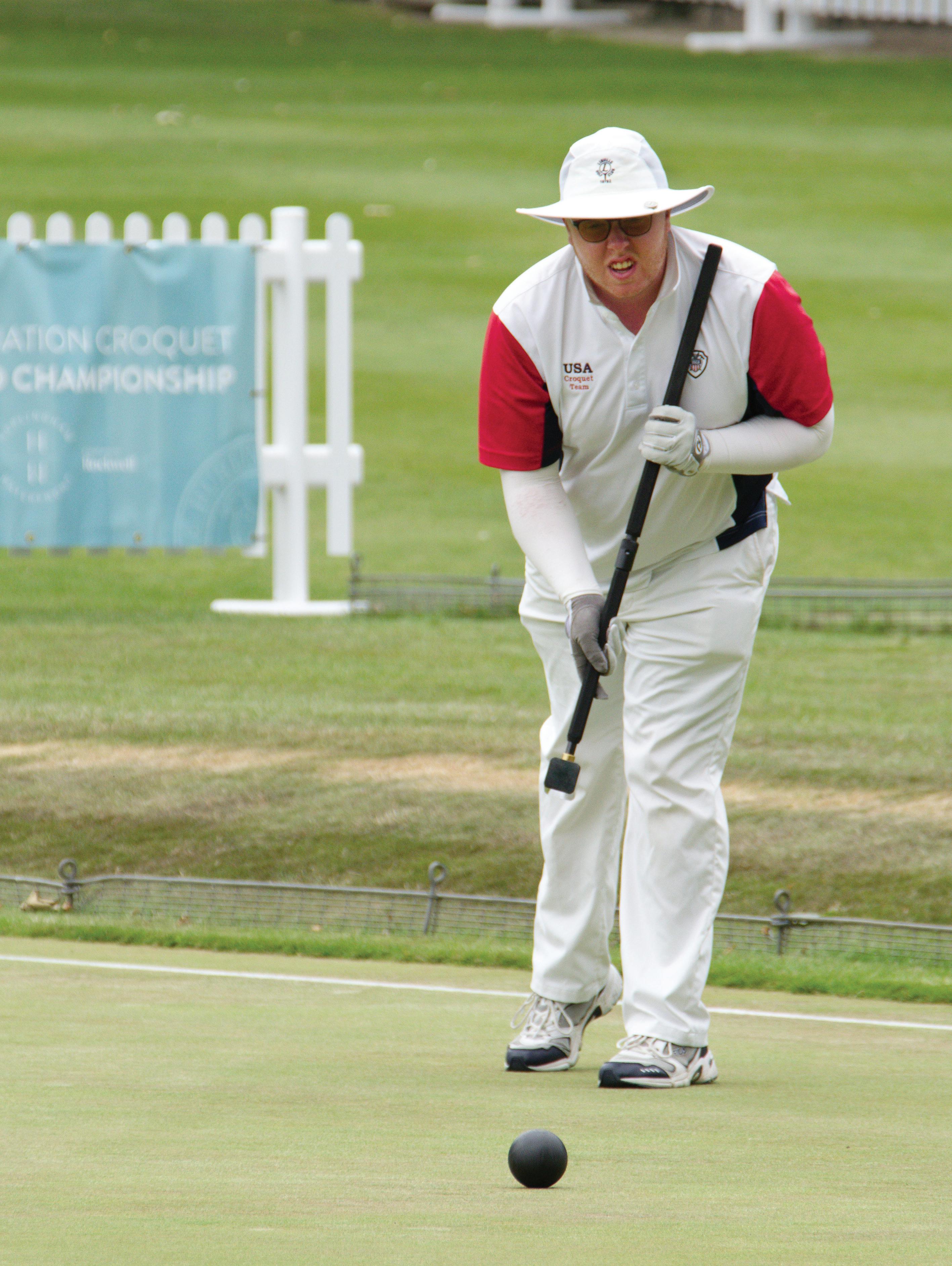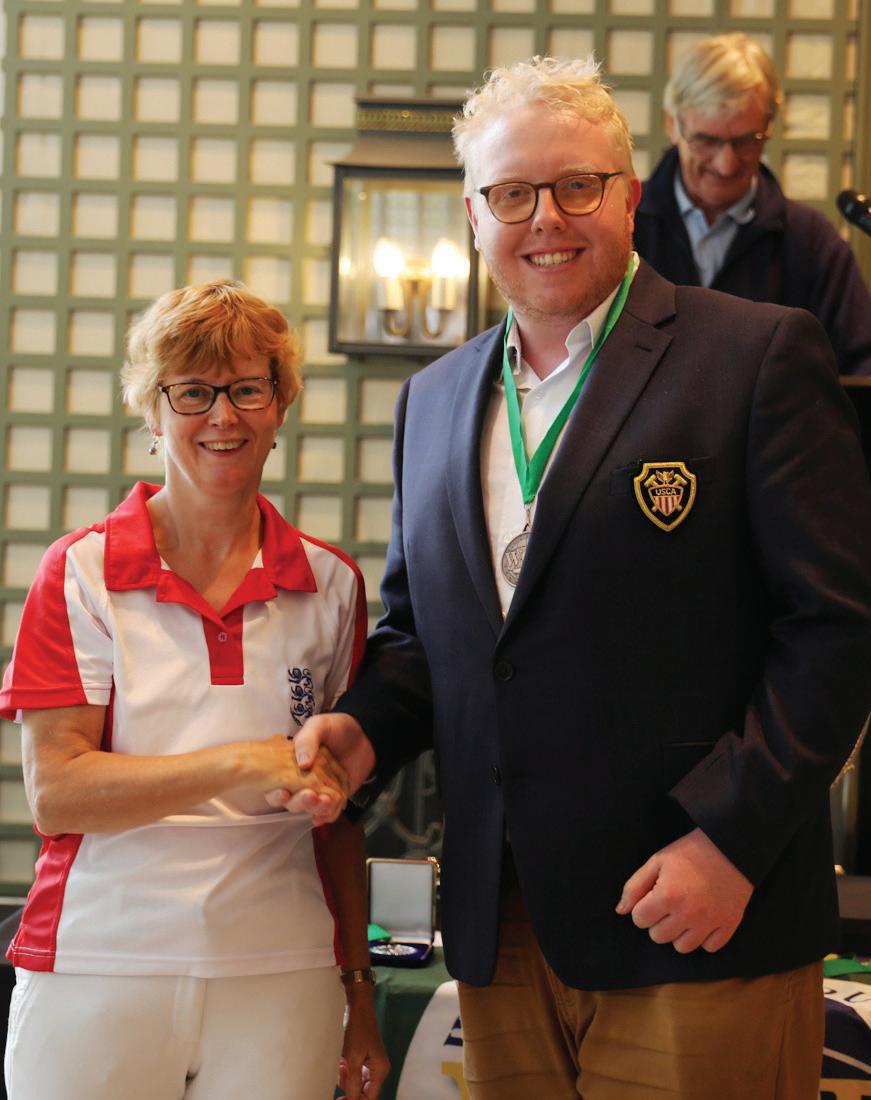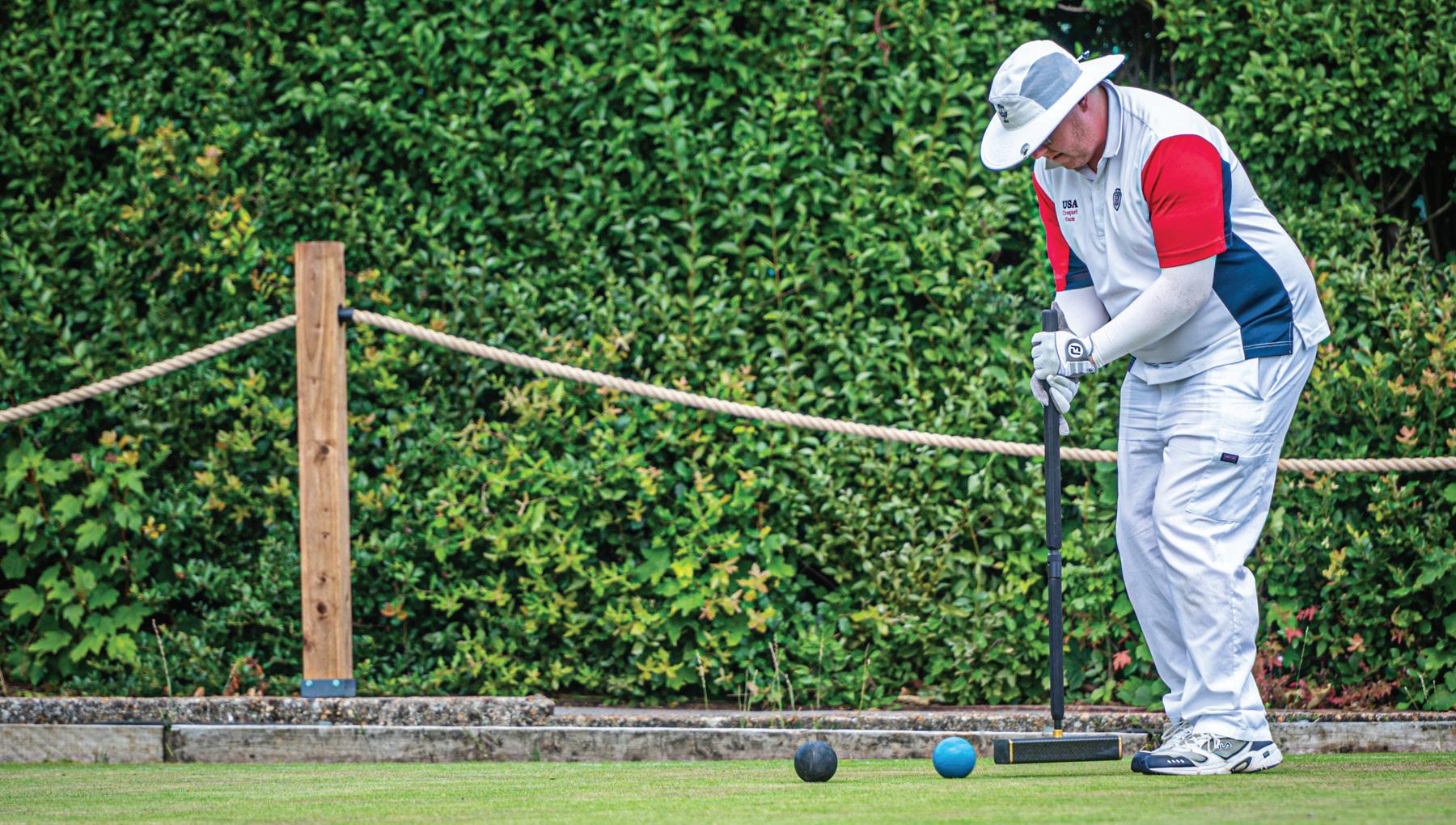
14 minute read
A Run for Bronze
Thomas Balding becomes the sixth American to earn an AC World Championship medal
Playing in his first World Croquet Federation AC World Championship, 26-year-old Thomas Balding made quite a showing as he knocked off former World Champion Stephen Mulliner in round one of the knockout, and then followed that with a dazzling run to the semifinals. He took a bit of time shortly after his return from the event in London to join Croquet News for a Zoom interview from Grandfather Golf and Country Club, where he works as a club pro.
That was an incredible run to be in the last four at AC Worlds. What is your take on the event overall and your performance?
I’m feeling positively over the moon about it. I went into the tournament expecting to make the knockout. I would say that I would’ve played rather poorly not to. But only four out of 10 players make it out of the block and it’s still difficult because those players are not too shabby. Even up to the third day of block play, I was a little bit on the bubble. I needed to win out and thankfully I did.
Once I made it to the knockout, I knew it was possible to get knocked out in the first round. These players are some of the best in the world. And I got Stephen Mulliner in round one, and it was a tough match. It went to three games, and I had to win the last two.
I think for me it really went well because after the MacRobertson, I had sort of gone back to the drawing board on some aspects of my mental game on how I approach tournament or match play, where you do have to win more than one game. You can’t lower your guard because you’ve won a game. There’s always a way for your opponent to claw their way back. So, I think that really helped me and was one of the reasons I went as far as I did.
I was very happy to make it to the semis. It stung a little bit — the way I went out. I felt like I had chances. But making it that far, I needed some luck and a couple of really good days of croquet, but I’d be super happy to get that far again.

That was kind of a tough draw to go up against Mulliner in round one. A lot of times it’s hard to follow up after getting a big win like that but you found a way.
Harry Fisher in round two was a Mac player — he was on the winning English Mac team as their number two, and he had just won the British men’s championship. I believe he was ranked
10th when I played him, and the match was at his home club of Roehampton. I really needed to pull out all the stops. It was probably the best overall day of croquet of my life. I played the best croquet I felt I’d ever played and it was still a tough match. I won in three, but he was not whipped in any one of those three games. He had chances and I just managed to edge him out. So then, with Alain Giraud in the quarterfinals, he definitely didn’t play as well against me as he had the day before beating Reg Bamford. He had beaten Bamford in five, and I watched him play and I was like, my goodness, if he comes out playing like that tomorrow, this might be over for me. And thankfully, I managed to sort of maintain my level of croquet. And I think he was a little bit tired out from that long match the day before, so he didn’t quite play up to the same level.
Then with Fulford, that was sort of my worst day in the knockout. I definitely didn’t play up to the level I had before, and you know, against a guy like Fulford, you have to because … talk about a croquet legend, you know, he is “the guy.” But it was a good match and I know I had chances. I know I could have gotten through to the final, but it’s just the way it fell out.
You are well known for your ability to hit in. What is the key to your ability to hit in from almost any distance?
I practice a lot. During the croquet season here, after I’m done with work, I try to put in two to four hours of practice a day. A good portion of that is just me practicing the single ball shots — playing games of golf croquet against myself, just doing long shots, giving myself shots at different distances, corner to corner, Tea Ladies, different things like that. The approach is, it’s not enough to hit a quarter of a ball, you have to hit 3/4 of a ball. You must hit the center of the ball.
To me, that’s very relaxing. It’s very fun when I’m doing that practice, so I can do it for hours and hours. I end up hitting a lot of balls and I’m paying very close attention when I do that to how the swing feels. What things in my swing are always present in the good ones versus the not so good ones? What things can I get rid of to make it simpler and more compact? What are my natural tendencies? Like which side do I miss on? What are my natural negative tendencies in a swing? Like do I pull it left? Did I let this hand take over?
I’m constantly sort of doing these calculations? And when I’m in a match setting like I was at Worlds, I’m able to sort of fall back on that; sort of shut out the fact that I need to hit this ball and go back to — I know all of my swing mechanics, I have everything in my head. And I can just focus on the few couple of things I need to consciously focus on and just let the swing do its work.
Do you ever have periods where you feel like “I’m not hitting it right?” where you’re not feeling good about how you’re hitting it and you have to play out of that?
Oh yeah, I’ll have whole days where I feel like that, where it’s just not working. I think I do everything right. It feels good and I keep missing the ball two inches on the right-hand side or something like that. And it’s like I couldn’t have put a better swing on that, so something must be wrong.
There are little microscopic things that are going to leach into your swing on any given day. It might be that I’m just tired. It might be that I’m dehydrated. It might be that I’m just not feeling that particular thing that I’m doing at that moment because I’m focusing on other things.
When that happens, normally I’m able to play through it quickly enough. I sort of just go back to my basic fundamentals. Take all the extra trimmings out of it and just focus on the rhythm of your swing and feeling the follow-through. Don’t worry about the timing. Don’t worry about your hands. Just count it out: 1, 2, 3 swing.
That seems to be one of the traits that separates elite players from average players: having a better process or method for getting out of a period of bad form.
I think a lot of it too comes down to confidence — just believing you’re going to put a good swing on it. Like when I played Fulford, it was interesting because I don’t think I missed a hit in between 9:30 in the morning and about 3:00 in the afternoon. And then I missed one. And I didn’t make another one. And I only had like two or three after that, but it was like as soon as I missed, I was now like, the match isn’t going my way. I was feeling pressure and because I missed what I thought was a relatively easy hit in, something subconsciously in my mind just switched and, all of a sudden, I was out of that zone. So, I think a lot of it changed mentally, even though I don’t think physically anything changed. From a confidence standpoint, I wasn’t swinging as freely and as well as I had been because now the armor was broken.

So, we heard you working with Mulliner to do the commentary in the final between Essick and Fulford. Was that your first time as a commentator and how was that experience?
No, I’ve never done that before. I’ve been kind of wanting to try it out to see how well I could do. I definitely felt like, “I’m sitting next to Stephen Mulliner and I have no expertise compared to this man.” So, anything technically speaking, I will mostly defer and just bounce questions off him and see what his more experienced thoughts are. I think that served me well because Fulford obviously is tactically far beyond me. And Matthew is also tactically beyond me. So, to truly understand what’s going on, I want to hear Mulliner’s take. Mostly, I just focused on the interaction with the people who are watching and the comments section.
Is there anything new that you learned from playing in the event?
It was really the first time where I’ve truly appreciated how much the mental game affects your play. I’ve always known that and people talk about it, and it’s one of those things that academically you can understand, but I’ve never had it in practice that severely. Like, I would have never won those matches six months ago. Without going to the Mac, I don’t make it past the first round of the knockout.
The Mac was really a transformative experience for me. Some of the mental things you need to do to be able to win these types of matches when you’re behind — like when I went one game down to Mulliner, in my old mental framework — I’m done. There’s no way I’m pulling this one back. He’s whooping me. Even in game two, when we were down to the two versus one game and he was still whooping me, it’s like I was able to sort of stay in the moment and think, I just need one opening. And he pegged his peg ball out, and even though it’s four back and Hoop 3 and he’s still the favorite — all of a sudden, I have this mentality of that was the opening — he made a mistake. It’s about finding that ability to just stay in the moment and not get down on yourself.
From a physical perspective, I definitely think my break play needs to get tighter. I’m really happy with the hitting. It keeps me in the fight, but I get myself into more trouble than I ought to with slightly loose break play. Thankfully, those lawns were flat and even enough that some sloppy break play can be played through. But some triple peels didn’t happen because of poor management. Certain turns almost didn’t get finished because I almost gave them away.
Eight American players made the knockout. What do you think that says about the level of AC play in the States?
I think it’s undeniable that we have one of the best top-level groups that we’ve ever had. It’s also one of the youngest. The new Solomon team that will be playing in November — Ben Rothman is the oldest member and he’s not 40 yet. Six or seven years ago, you had almost no young guys at the top level. And now, the top five or six guys are mostly under the age of 35, right? I think that has been a recent and distinct change that has led to a lot of good things.
The other thing, most of those young guys, myself included, are teaching pros that spend a lot of the year or the entire year on the courts teaching, practicing and you know, eating, sleeping and breathing croquet. Some of the older players have careers and jobs unrelated to croquet and only get to play and practice during tournaments or on the weekend. It was even remarked at the event, the international players were like, “we wish we had a culture like that where you could teach and be on the court” because they were seeing how quickly it has benefited us.
Is there anything about playing in the World Championship that people who haven’t attended would be surprised to learn?
I think that in this country we don’t experience the endurance test of match play that they do in England. It’s a fairly typical thing in England to have two-out-of-three matches in AC.
Three-out-of-five is their ideal and that can go all day. We’ll be playing from 9:30 a.m. until like 9:30 p.m. sometimes. And maybe you have to peg down and it’s just something that they treat as typical. If they have a final, it’s a three-out-of-five. Here in the U.S., we only really go up to two-out-of-three. It’s just a different level of an endurance contest. It makes you approach the game differently. It makes you pace yourself differently. It makes your outlook on losing and winning a single game a little bit different because you can lose a game and still be perfectly fine. Whereas in a two-out-of-three, like when I played Mulliner, I must win two games in a row to win. Otherwise, it’s over. If I lose the first game in a best-of-five, I don’t have to win the next two games in a row. I have some leeway.

That’s been sort of a concern of the American players for things like the Mac and for World Championships. We need to get more accustomed to this longer match play that other countries are regularly engaging in because we don’t have the mental stamina for that type of play.
Thank you for spending some time with the Croquet News. Is there anything we haven’t asked about that you would like to comment on?
I know Matthew fell a little bit short, but it really is amazing to me in such a short amount of time — I mean, I know he’s been playing for 20-something years, but even to see how far he’s come from when he was 18 to 19 years old to now. He truly has become one of the world’s leading players and we all favored him to beat Fulford. Had it not been for one or two unlucky shots, we all know he could have won. It really is amazing to see an American get that close twice in a row. We’ve never had sort of a leader like that. A player that we could all look to and say, “Wow, he’s on the cusp every time. He’s outplaying the best players in the world.”
Obviously, in his prime, Ben Rothman was very good. He made it to a final. David Maloof made it to a final. These are top-level players. But seeing Matthew play, you really get the sense now that we have something to aspire to. For a lot of the young guys, he is sort of like the metric that keeps us pushing to be better. If anyone out there is looking to get better at AC and wants to see the way forward, find a video of Matthew playing. It will make you appreciate how good the game can be. There were some great videos of Matthew playing during this tournament. The Finals is a great one. He played fantastic croquet. And Fulford just got a little lucky on some things and also played fantastic. Watching that will give you a lot of guideposts as to how to improve your game.








